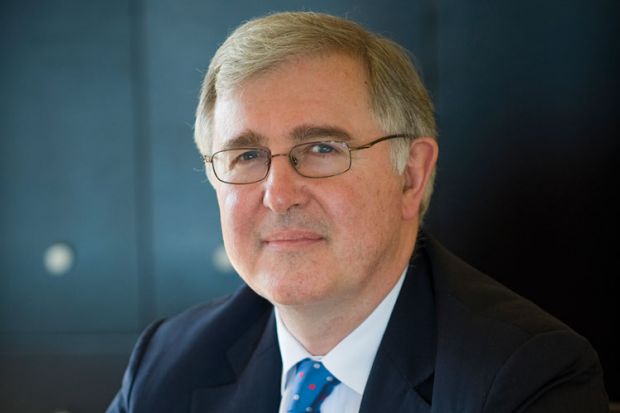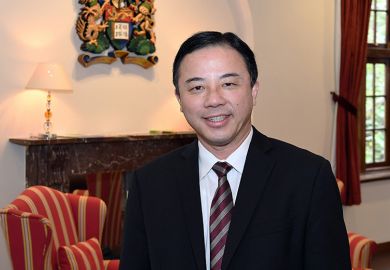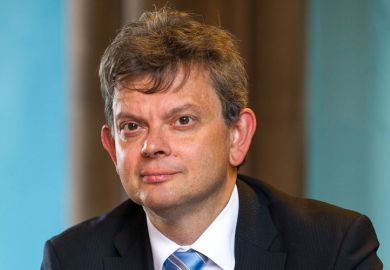Source: King’s College London
Acquiring one of the UK capital’s grandest buildings is quite a coup for King’s College London. But King’s could once have occupied an even more prestigious site than Bush House, the former BBC World Service headquarters fronted by neoclassical columns, which it will take over next year.
“When King’s was founded in the 1820s, there was a possibility it might have acquired the site that is now Buckingham Palace,” says Ed Byrne, the college’s principal and president.
Its new site is not a palace, but the famous 1920s landmark on the Strand will still take some beating as a university centrepiece.
Byrne, who took over at King’s last summer after serving as vice-chancellor of Australia’s Monash University, says that the capture of Bush House and four associated buildings is a “defining moment” in the university’s history.
The Aldwych Quarter will roughly double the size of the university’s “tightly populated” Strand campus, which is home to about half its 27,000 students, says Byrne.
But it will not lead to a significant expansion in student numbers, which are expected to grow to 30,000 over the next three to four years.
A large proportion of these extra 3,000 places is likely to be filled by international students, despite the abolition of undergraduate number controls this autumn, says Byrne.
“We do not wish to decrease the number of domestic students, but the proportion of international students will increase modestly,” he says. “If one could attract more high-quality undergraduates, we would take them, but the pool of such students is not increasing.” That refusal to take lower-qualified students emulates his policy at Monash when institutional number caps were rolled back in Australia between 2009 and 2012.
“If you reduce entry requirements as a high-level research university you risk admitting students who are not prepared and lowering your academic credibility [in] the international market,” he says.
International partnerships
On the international front, Byrne rules out setting up any international campuses aimed at undergraduates, despite overseeing Monash’s campuses in Malaysia, India, China, Italy and South Africa. However, he does talk of establishing a “handful of deep academic partnerships across the world”, possibly centres at overseas universities on the same academic level as King’s.
Of course, the new Aldwych Quarter, which is likely to contain a business school and computing department, will be a major draw for international students coming to London.
With that site and its continuing £1 billion redevelopment of its Strand campus, is King’s seeking to steal a march on its neighbours, the London of School of Economics and University College London? Both are forging ahead with campus redevelopments: the LSE, which opened its £24 million award-winning Saw Swee Hock Student Centre last year, is to build a new 12-storey social sciences centre at a cost of £90 million, while UCL is pushing ahead with plans for a second campus in Stratford, East London.
However, Byrne prefers to view all these projects as a sign of the capital’s renaissance in the past few years, with higher education now playing a major part in confirming London’s reputation as one of the world’s most vibrant cities. “Part of the London story is that it’s a great university city – that is something that eclipses the interests of any individual institution,” he says.

Erase and rewind
Byrne says he is delighted to return to London for a third stint, having trained as a neurologist in the capital in the early 1980s and later having served as vice-provost (health) at UCL, from 2007 to 2009.
With King’s enjoying a “fantastic” research excellence framework last year, which meant it was the country’s “most improved” university, Byrne says that he feels the same sense of momentum he felt while at UCL.
Nonetheless, his first eight months have been fairly tumultuous, particularly given the backlash against unsuccessful plans to change the university’s name to “King’s London”. Byrne dismisses the furore, which saw more than 12,000 people sign a petition against the plans, as a “storm in a teacup”.
The proposals arose for “very good reasons” because the college moniker was not widely understood by those outside the academic community and a “refresh of the King’s visual identity” – in particular its 22-year-old logo – would happen at some point.
Might the desire to rid itself of the word “college” also point to a feeling that King’s has outgrown the University of London and – like Imperial College London in 2006 – may leave in the near future?
Byrne insists not, saying the University of London “plays an important role” in providing some useful partnerships around shared services and resources.
“If the federal university did not exist, we would have to invent it,” he says.
King’s has also faced criticism and walkouts for making staff at its highly regarded health schools redundant while undertaking vast capital improvement projects.
Does its capture of the Aldwych Quarter, whose annual cost has yet to be disclosed, merely prove the accusation that it is more interested in buildings than people?
Byrne says that the job cuts were required because “there was a cross-subsidy from the humanities to the health schools, which has now been remedied by the redundancy programme”.
“All parts of the university are performing on target and there is no cross-subsidy,” he adds.
The university has also been embroiled in a long-running fight over whether salaries of senior staff should be disclosed, overturning an order by the Information Commissioner’s Office to state the remuneration of all 125 members of staff who earned more than £100,000 a year.
“Vice-chancellors’ pay should be reported openly and fully, but I am not sure whether it’s in the country’s advantage for more junior staff to have their salaries linked to their names,” he says, citing issues of “privacy, competitiveness and equity” in not disclosing pay deals.
On his own pay, Byrne would not disclose his salary, but confirms that he took a pay cut to come to King’s – having been among Australia’s highest-paid vice-chancellors on a salary of around A$1 million (£520,000) – and will decline any pay rise while he is at King’s.
He says that he will now focus on consolidating King’s as one of the world’s top 20 universities and playing his part in making London the world’s greatest university city.
“London is fizzing in every single way and the university world is very much part of that story,” he says.
Register to continue
Why register?
- Registration is free and only takes a moment
- Once registered, you can read 3 articles a month
- Sign up for our newsletter
Subscribe
Or subscribe for unlimited access to:
- Unlimited access to news, views, insights & reviews
- Digital editions
- Digital access to THE’s university and college rankings analysis
Already registered or a current subscriber? Login





